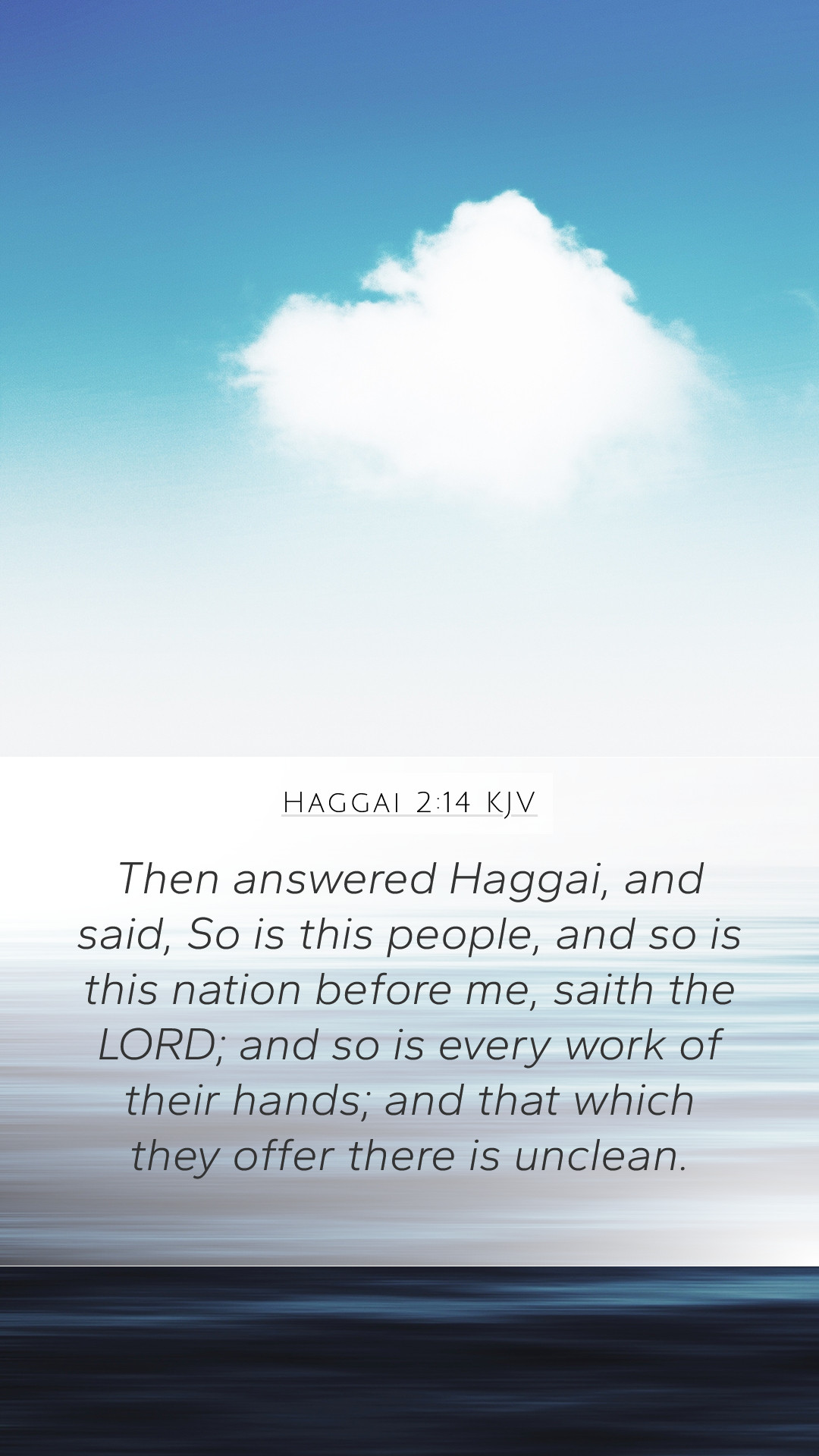Old Testament
Genesis Exodus Leviticus Numbers Deuteronomy Joshua Judges Ruth 1 Samuel 2 Samuel 1 Kings 2 Kings 1 Chronicles 2 Chronicles Ezra Nehemiah Esther Job Psalms Proverbs Ecclesiastes Song of Solomon Isaiah Jeremiah Lamentations Ezekiel Daniel Hosea Joel Amos Obadiah Jonah Micah Nahum Habakkuk Zephaniah Haggai Zechariah MalachiHaggai 2:14 Meaning
What is the meaning of Haggai 2:14?
Then answered Haggai, and said, So is this people, and so is this nation before me, saith the LORD; and so is every work of their hands; and that which they offer there is unclean.
Haggai 2:14 Bible Verse Meaning
Understanding Haggai 2:14
In Haggai 2:14, the Lord communicates through the prophet Haggai, illustrating the importance of holiness and its implications for the people of Israel. The verse states:
"Then Haggai answered and said, So is this people, and so is this nation before me, saith the Lord; and so is every work of their hands; and that which they offer there is unclean." (Haggai 2:14 KJV)
Verse Meaning and Interpretation
This verse acts as a reminder that the state of the people's offerings and actions is tainted by their uncleanliness.
Analysis from Public Domain Commentaries
-
Matthew Henry's Commentary:
Henry emphasizes that just as cleanliness or uncleanliness contaminates, the spiritual state of the people reflected in their offerings impacts their relationship with God. He highlights that external sacrifices are meaningless if the heart is not right with God.
-
Albert Barnes' Notes:
Barnes interprets this as a prophetic warning. He suggests that the people’s attitude and actions symbolize their overall condition before God. The “unclean” status not only affects the offerings but serves as a metaphor for their impure living among the nations.
-
Adam Clarke's Commentary:
Clarke notes the emphasis on the holiness of God and His expectations of His people. He concludes that the verse illustrates that divine acceptance requires purity that stems from sincere faith and adherence to God's commands.
Spiritual Implications
The central theme in Haggai 2:14 establishes that:
- The holiness of God is non-negotiable.
- Religious practices void of sincerity are unacceptable.
- The way one lives is intrinsically linked to the acceptability of their worship.
Bible Verse Commentary
This verse emphasizes several key lessons that can serve as Bible study insights for anyone involved in Bible study groups. Here are the main takeaways:
- Holiness and Offerings: Just as the people of Israel were challenged, contemporary believers are reminded that their worship and offerings must come from a pure heart.
- Impact of Sin: The effects of sin are not limited to the individual but can influence the community, thus highlighting the need for collective purity before God.
- God’s Acceptance: It ultimately serves as a reminder that God examines not only what is done, but the motives and condition of those who act.
Application to Daily Life
Understanding Haggai 2:14 can guide how believers approach their spiritual lives. In a world filled with distractions and false piety, this verse encourages:
- Regular self-examination of one’s motives in worship and deeds.
- A conscious effort to pursue holiness and righteousness.
- A commitment to biblical principles that promote purity in all aspects of life.
Cross References
Other verses that resonate with Haggai 2:14 include:
- Isaiah 1:11-15: Discusses the uselessness of offerings made without true repentance.
- Malachi 1:6-14: Condemns unworthy sacrifices and calls for honor towards God.
- James 4:8: Encourages believers to cleanse their hands and purify their hearts.
Conclusion
Haggai 2:14 serves as a profound reminder of the need for holiness among the people of God. Through Bible verse explanations and insightful Biblical exegesis, it is clear that acceptable worship is rooted in genuine faith and purity. By regularly engaging in online Bible study or utilizing Bible study tools, believers can deepen their understanding of such important teachings.


